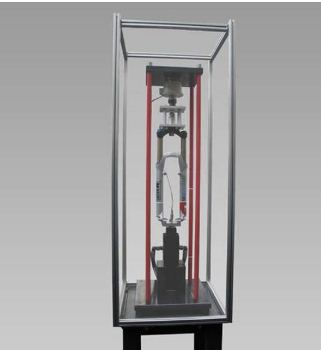Sep 18 2011
Fatigue tests are a vital element of quality assurance in machine and vehicle manufacturing. To further enhance its teaching in this field, HS Ulm (Ulm University of Applied Sciences, Germany) has developed a fatigue test stand for suspension forks as part of a study project, with support from Zwick in the form of equipment and expertise.
The project involves studying the effect on the life-expectancy of mountain-bike suspension forks of cyclic loads generated while traveling downhill. To obtain realistic data, a video camera was used to record damping travel on a bike being ridden downhill, with data import via software written in-house. Ulm University of Applied Sciences builds special test stand
Ulm University of Applied Sciences builds special test stand
The test stand was also designed by the university and comprises a four-column load frame. Suspension forks are subjected to cyclic loads via a servo-hydraulic testing actuator attached to the lower mounting-plate. System control is by ControlCube - 'the world's smallest controller' - with Cubus testing software. A particular feature of this combination is ease of operation, allowing students to quickly become familiar with fatigue testing and carry out tests unsupervised after only a short time. As an added bonus, the system's 4kHz control frequency, 19-bit-resolution data-logging and capacity for expansion to 32 control channels enable it to be used for more complex applications whenever required.
Data from field tests is imported via the Cubus software and used to perform realistic simulation tests. "Using the Zwick iteration software we can import and simulate any given route profile and generate findings regarding wear and load under real conditions," states Dipl. Ing. Daniel Stiehle of HS Ulm's testing laboratory. ControlCube is also used to import data from strain gauges applied to fork hub-mounts, providing detailed information about local loads on the forks.